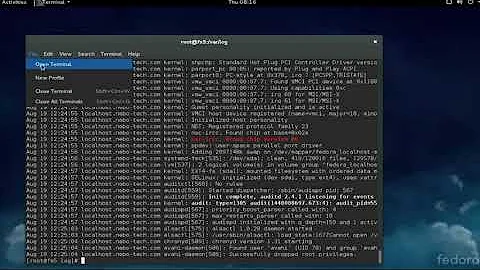Reading from a continuously changing logfile
I might be misunderstanding the question, but is there a reason you can't use this?
tail -f /location/of/thefile | grep -i -E "foo|bar"
Related videos on Youtube
Gilles 'SO- stop being evil'
Updated on September 18, 2022Comments
-
 Gilles 'SO- stop being evil' almost 2 years
Gilles 'SO- stop being evil' almost 2 yearsThere is
/location/of/thefile, which is a continuously changing logfile. The average density of refreshes is 4 per minute, the possible maximal refresh rate could be 30-40 per minute. Every refresh adds 2-5 lines (average), but it could be hundreds in extreme cases. Every line begins with a[YYYY-MM-DD HH:MM:SS]timestamp followed by plaintext (100-200, max. a few hundred characters).My task is to construct a simple command which continuously watches this logfile, and sends to the stdout every lines that contain the
fooORbaralphabetical strings. Before and after those (sub)strings there could be any characters (\nonly after the (sub)string, of course), even\0. The capitalization of the words could be all of the possible variations.Well, my ideas for the solution always contain syscalls for the timing, but I shouldn't use them. Please construct me a simple command. Thanks a very lot!
-
Kromey about 13 yearsDoes piping the output of
tail -ftogrepreally work like that? If so, I'm going to have to start using that myself! For a case like this I would have suggested awatchcommand, but if this does indeed work it's so much better! -
mattdm about 13 years@Kromey: how would you expect it to work?
-
Kromey about 13 years
tail -fjust continually streams output to stdout, right? I'd always been under the belief that all Unix redirection operators wait until all the output/input is ready and then move it along, i.e. buffer it all until the sending program/file is done. Thus I wouldn't expect the|in Sean's command here to send anything along togrepuntiltailis done spitting out lines, which of course with the-fflag it won't ever do until it is interrupted. (I'm not at a *nix box to try this out, though, otherwise I would have just tested it instead of asking.) -
Sean C. about 13 yearsIt works, I use it lots; most of the time to track mail for whiney users.
tail -f /var/log/mail.log | grep -i "[email protected]" -
 forcefsck about 13 years@Kromey, depends on the command after the pipe. If it is
forcefsck about 13 years@Kromey, depends on the command after the pipe. If it issortorwcit will wait theend-of-fileto start sorting, if it isgreporsedor another line processing command, it will process input everyend-of-line, which is the default character for flushing the i/o stream buffer. -
Kromey about 13 yearsThanks, guys! Another useful tool to add to my belt! :-)




